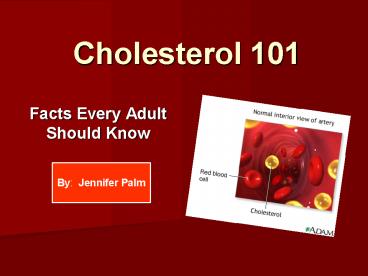Cholesterol 101 PowerPoint PPT Presentation
1 / 22
Title: Cholesterol 101
1
Cholesterol 101
- Facts Every Adult Should Know
By Jennifer Palm
2
What is Cholesterol?
- A waxy, fat-like substance
- Produced naturally
- in the body
- - via the liver
- Also consumed through your diet
Sources of cholesterol
3
Cholesterol Continued
- Its normal to have a certain amount of
cholesterol in your body - In fact, its needed for good health
- to produce cell membranes and various hormones
- But too much cholesterol can have a negative
impact on your health
4
Types of Cholesterol
- There are two different kinds
- Low-density lipoproteins (LDL)
- Often referred to as bad
- cholesterol
- High-density lipoproteins (HDL)
- Often referred to as good
- cholesterol
5
Types of Cholesterol Contd
- Low-density lipoproteins
- deliver cholesterol to the body
- stick to the walls of the arteries clogging
them - High-density lipoproteins
- carry the LDL to the liver to be broken down
- work to protect the arteries from plaque build up
6
High Cholesterol
- Also known as hypercholesterolemia
- Greatly increases your risk of having a heart
attack or stroke
7
High Cholesterol Continued
Extra cholesterol in the blood
Builds up on the walls of your arteries
Causing arteries to narrow or harden - a process
known as atherosclerosis
Which can completely block an artery
8
High Cholesterol Continued
This picture illustrates how cholesterol builds
up in your arteries over time.
9
High Cholesterol Continued
A blocked artery has the potential to be
extremely life-threatening.
10
Contributing Factors
- Diet
- Consuming foods high in saturated/trans fats and
dietary cholesterol - Includes
- Fast food
- Fried food
- Egg yolks
- Meat
- Dairy products
11
Contributing Factors Continued
- Obesity
- Major risk factor for heart disease
- Usually due to an intake of foods high in
saturated fats - Smoking
- Another risk factor for heart disease and stroke
- Reduces HDL and changes LDL
12
Contributing Factors Continued
- Inactivity
- Can lead to weight gain
- Raising LDL cholesterol
- Heredity
- High cholesterol tends to run in families
- Resulting in high levels of LDL
13
Contributing Factors Continued
- Gender and Age
- Men usually develop coronary artery disease
earlier than women - Men tend to have lower HDL levels while women
have higher LDL - Everyones LDL levels rise as they age
14
Contributing Factors Continued
- Other Medical Conditions
- There are other conditions that can also affect
your cholesterol levels, including - Kidney disease
- Diabetes
- Hypothyroidism
15
Recommended Values
If total cholesterol and LDL are higher than
recommended values or if HDL is lower, you are at
an increased risk for heart disease.
16
Cholesterol Testing
- There are no signs and symptoms
- So, get your blood cholesterol checked at least
once a year by your physician
17
Cholesterol Testing Continued
- If your cholesterol is high
- You will be put on a diet and exercise regimen
- If that does not work, you will be put on
medication
18
Suggestions For Lowering Cholesterol
- Maintain a healthy diet
- Limit saturated and trans
- fats in your diet
- Increase dietary fiber
- Eat plenty of fruits and
- vegetables
- They contain zero cholesterol!
19
Suggestions For Lowering Cholesterol Contd
- Maintain a healthy weight
- Being overweight or obese can drastically
increase LDL levels - Losing weight can lower these levels
- A proper diet and regular physical activity
- can help you achieve this!
20
Suggestions For Lowering Cholesterol Contd
- Be active
- Engage in at least 30 minutes of physical
activity on most, if not all days of the week
- Benefits
- lower cholesterol levels
- maintain a healthy weight
21
Suggestions For Lowering Cholesterol Contd
- Quit smoking
- It speeds up the process of atherosclerosis
- Limit alcohol consumption
22
References
- http//www.americanheart.org/presenter.jhtml?ident
ifier1516 - http//familydoctor.org/online/famdocen/home/commo
n/heartdisease/risk/029.html

